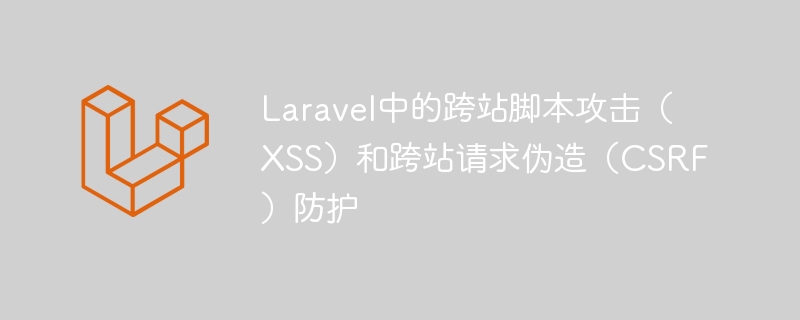 PHP Framework
PHP Framework
 Laravel
Laravel
 Cross-site scripting (XSS) and cross-site request forgery (CSRF) protection in Laravel
Cross-site scripting (XSS) and cross-site request forgery (CSRF) protection in Laravel
Cross-site scripting (XSS) and cross-site request forgery (CSRF) protection in Laravel

Cross-site scripting (XSS) and cross-site request forgery (CSRF) protection in Laravel
随着互联网的发展,网络安全问题也变得越来越严峻。其中,跨站脚本攻击(Cross-Site Scripting,XSS)和跨站请求伪造(Cross-Site Request Forgery,CSRF)是最为常见的攻击手段之一。Laravel作为一款流行的PHP开发框架,为用户提供了多种安全机制来防护XSS和CSRF攻击。
一、跨站脚本攻击(XSS)
XSS攻击是指攻击者通过注入恶意脚本代码到网页中,使得用户在访问该网页时执行恶意代码。XSS攻击可以窃取用户的敏感信息、篡改网页内容甚至盗取用户账号。
在Laravel中,可以通过以下几种方式防护XSS攻击:
- 使用Blade模板引擎自动转义输出内容
Blade模板引擎是Laravel的一大特色,它会自动对输出的内容进行转义,以防止XSS攻击。例如,当我们使用{{ $content }}输出内容到视图中时,Laravel会自动对$content进行HTML字符转义。
示例代码:
<div>
{{ $content }}
</div>- 使用
{{!! $content !!}}手动转义输出内容
如果我们需要输出的内容包含HTML标签,可以使用{{!! $content !!}}手动关闭自动转义功能。注意,在使用{{!! $content !!}}输出内容时,需要确保$content的内容是可信任的,避免插入恶意代码。
示例代码:
<div>
{!! $content !!}
</div>- 使用XSS过滤器
Laravel提供了htmlspecialchars函数来过滤用户的输入,可以有效防止XSS攻击。我们可以在处理用户输入参数时,使用htmlspecialchars函数对参数进行过滤。
示例代码:
$userInput = '<script>alert("XSS攻击");</script>';
$filteredInput = htmlspecialchars($userInput);
echo $filteredInput; // 输出: <script>alert("XSS攻击");</script>二、跨站请求伪造(CSRF)
CSRF攻击是指攻击者通过伪造请求,利用用户在目标网站中的身份权限进行非法操作。这种攻击可能造成用户账号被盗、篡改用户数据等危害。
Laravel提供了CSRF防护中间件和生成Token机制来防护CSRF攻击。
- 使用CSRF中间件
Laravel默认会为所有POST、PUT、DELETE请求验证CSRF Token。我们只需要在前端表单中添加@csrf指令,Laravel会自动生成CSRF Token并验证请求的合法性。
示例代码:
<form method="POST" action="/submit"> @csrf // 其他表单字段 <button type="submit">提交</button> </form>
- 使用
csrf_token函数
除了在表单中使用@csrf指令,我们还可以使用csrf_token函数生成CSRF Token,并自己手动添加到请求中。
示例代码:
<form method="POST" action="/submit">
<input type="hidden" name="_token" value="{{ csrf_token() }}">
// 其他表单字段
<button type="submit">提交</button>
</form>- 使用
VerifyCsrfToken中间件
我们可以在app/Http/Middleware/VerifyCsrfToken.php中添加需要忽略CSRF验证的URL或者路由。这些URL或路由将不会经过CSRF Token验证。
示例代码:
class VerifyCsrfToken extends Middleware
{
/**
* 需要排除CSRF Token验证的URL或路由
*
* @var array
*/
protected $except = [
'/api/callback',
'/api/webhook',
];
}通过以上多种方式,在Laravel应用中可以有效防护XSS攻击和CSRF攻击,提高应用的安全性。同时,开发人员也应加强对网络安全的学习和意识,定期更新框架和依赖库,保持应用的安全性。
The above is the detailed content of Cross-site scripting (XSS) and cross-site request forgery (CSRF) protection in Laravel. For more information, please follow other related articles on the PHP Chinese website!

Hot AI Tools

Undresser.AI Undress
AI-powered app for creating realistic nude photos

AI Clothes Remover
Online AI tool for removing clothes from photos.

Undress AI Tool
Undress images for free

Clothoff.io
AI clothes remover

Video Face Swap
Swap faces in any video effortlessly with our completely free AI face swap tool!

Hot Article

Hot Tools

Notepad++7.3.1
Easy-to-use and free code editor

SublimeText3 Chinese version
Chinese version, very easy to use

Zend Studio 13.0.1
Powerful PHP integrated development environment

Dreamweaver CS6
Visual web development tools

SublimeText3 Mac version
God-level code editing software (SublimeText3)

Hot Topics
 How to get the return code when email sending fails in Laravel?
Apr 01, 2025 pm 02:45 PM
How to get the return code when email sending fails in Laravel?
Apr 01, 2025 pm 02:45 PM
Method for obtaining the return code when Laravel email sending fails. When using Laravel to develop applications, you often encounter situations where you need to send verification codes. And in reality...
 How to implement the custom table function of clicking to add data in dcat admin?
Apr 01, 2025 am 07:09 AM
How to implement the custom table function of clicking to add data in dcat admin?
Apr 01, 2025 am 07:09 AM
How to implement the table function of custom click to add data in dcatadmin (laravel-admin) When using dcat...
 What is Cross-Site Request Forgery (CSRF) and how do you implement CSRF protection in PHP?
Apr 07, 2025 am 12:02 AM
What is Cross-Site Request Forgery (CSRF) and how do you implement CSRF protection in PHP?
Apr 07, 2025 am 12:02 AM
In PHP, you can effectively prevent CSRF attacks by using unpredictable tokens. Specific methods include: 1. Generate and embed CSRF tokens in the form; 2. Verify the validity of the token when processing the request.
 Laravel Redis connection sharing: Why does the select method affect other connections?
Apr 01, 2025 am 07:45 AM
Laravel Redis connection sharing: Why does the select method affect other connections?
Apr 01, 2025 am 07:45 AM
The impact of sharing of Redis connections in Laravel framework and select methods When using Laravel framework and Redis, developers may encounter a problem: through configuration...
 Laravel multi-tenant extension stancl/tenancy: How to customize the host address of a tenant database connection?
Apr 01, 2025 am 09:09 AM
Laravel multi-tenant extension stancl/tenancy: How to customize the host address of a tenant database connection?
Apr 01, 2025 am 09:09 AM
Custom tenant database connection in Laravel multi-tenant extension package stancl/tenancy When building multi-tenant applications using Laravel multi-tenant extension package stancl/tenancy,...
 Laravel Eloquent ORM in Bangla partial model search)
Apr 08, 2025 pm 02:06 PM
Laravel Eloquent ORM in Bangla partial model search)
Apr 08, 2025 pm 02:06 PM
LaravelEloquent Model Retrieval: Easily obtaining database data EloquentORM provides a concise and easy-to-understand way to operate the database. This article will introduce various Eloquent model search techniques in detail to help you obtain data from the database efficiently. 1. Get all records. Use the all() method to get all records in the database table: useApp\Models\Post;$posts=Post::all(); This will return a collection. You can access data using foreach loop or other collection methods: foreach($postsas$post){echo$post->
 How to effectively check the validity of Redis connections in Laravel6 project?
Apr 01, 2025 pm 02:00 PM
How to effectively check the validity of Redis connections in Laravel6 project?
Apr 01, 2025 pm 02:00 PM
How to check the validity of Redis connections in Laravel6 projects is a common problem, especially when projects rely on Redis for business processing. The following is...
 Laravel database migration encounters duplicate class definition: How to resolve duplicate generation of migration files and class name conflicts?
Apr 01, 2025 pm 12:21 PM
Laravel database migration encounters duplicate class definition: How to resolve duplicate generation of migration files and class name conflicts?
Apr 01, 2025 pm 12:21 PM
A problem of duplicate class definition during Laravel database migration occurs. When using the Laravel framework for database migration, developers may encounter "classes have been used...





